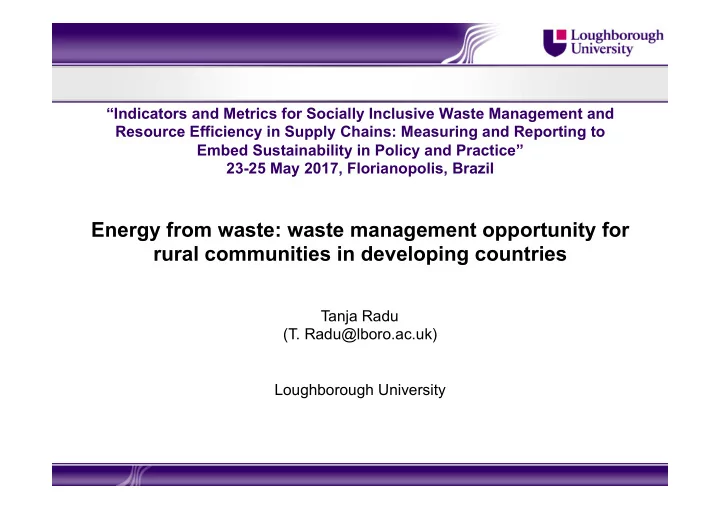

“Indicators and Metrics for Socially Inclusive Waste Management and Resource Efficiency in Supply Chains: Measuring and Reporting to Embed Sustainability in Policy and Practice” 23-25 May 2017, Florianopolis, Brazil Energy from waste: waste management opportunity for rural communities in developing countries Tanja Radu (T. Radu@lboro.ac.uk) Loughborough University
About me Tanja Radu Lecturer of International Relief, Water Supply and Sanitation Engineering Water Engineering and Development Centre (WEDC), School of Civil and Building Engineering, Loughborough Background: Environmental Engineering Serbia USA Ireland UK Belgrade University Auburn University Loughborough University Dublin City University BEng Environmental PhD Environmental Lecturer Postdoc, Project Manager Engineering Engineering Small scale anaerobic • Heavy metals in dust § • Monitoring air • Transport of arsenic (mining waste) digestion (agricultural pollution in groundwater and food waste) • Mapping soli pollution • Detection of hazardous gases-wearable sensors
Anaerobic Digestion- what is it? § Anaerobic Digestion (AD) is a natural process where plant and animal materials (biomass) are broken down by micro-organisms in the absence of air. § The AD process begins when biomass is put inside a sealed tank or digester. Products: § Methane-rich gas (biogas) that can be used to generate renewable heat and power; this helps cut fossil fuel use and reduce greenhouse gas emissions. § The remaining material (digestate) is rich in nutrients, so it can be used as a fertiliser.
Anaerobic digestion- an integrated process • A waste treatment process • Biogas, renewable energy • Nutrient recovery from digestate (N & P) • Social, financial and environmental benefits Implementation of this technology in rural areas has proved to be beneficial regardless of how economically developed is the country.
Substrates- suitable waste products Organic Feedstock (‘Substrate’) The yield of biogas depends on the composition and biodegradability of the feedstock of organic matter, also called substrate. Substrates that can be treated within Biogas plants include but are not limited to: • Waste from agriculture (e.g. manure, crop residuals) • Waste from food processing industries • Food waste from restaurants, canteens and markets • Waste from slaughterhouses (e.g. rumen content) • Source separated organic waste from households (e.g. kitchen leftovers) • Sewage sludge • Organic components of municipal solid waste (mixed waste)
Developing countries Waste, Water and sanitation § Poor waste management strategies § More than 1.1 billion people lack access to improved drinking water § 2.6 billion live without improved sanitation services § Waterborne diseases caused by lack of sanitation and hygiene (diarrhoea) the leading cause of childhood death (WHO, 2010) Issues in developing countries: • Waste management strategies • Affordable and environmentally friendly renewable energy source • Basic sanitation and access to drinking water • Reduction indoor air pollution AD can address the above issues! 6
Anaerobic Digestion- a triple win • Reduced households’ energy expenses • Increased crop yield • Stimulates the national economy- jobs creation • Waste management • Quality of life • Reduction of the biomass • Gender equality resource depletion • Health and sanitation (deforestation, erosion) • Education • Food security • Reduction of Green House Gases (GHG) emissions • Nutrient recovery 7
Anaerobic Digestion in developing countries Estimated a total of 43.8 million plants built in China § § Currently over 4 million biogas plants in India § Similar programmes in other developing Asian countries (Nepal, Bangladesh, Shri Lanka, Indonesia, Thailand), but also in Africa (Kenya, Tanzania, Ethiopia) and Latin American countries § Simple, low cost, low maintenance design (building a 2 m 3 digester costs 8000-10000 INR (£100) 8
AD projects at Loughborough: 1. Rural Hybrid Energy Enterprise Systems (RHEES), £2.7M EPSRC § Providing energy from waste for underdeveloped rural non-gridded Indian communities by the means of anaerobic digestion-cooking/ heating energy. § Bringing immediate improvement of quality of life for rural communities- research that matters! 2. Community Scale, decentralised Anaerobic Digestion for energy and resource recovery (UK-Thailand partnership)- British Council/ Newton Fund £250k § Remotely monitored, networked community digesters § Nutrient recovery 9
Kazakhstan/Bahrain potential projects Bahrain: British Council/Newton Fund £400k Establishing a permanent Research Centre for Sustainable Energy and Water at § the University of Bahrain Kazakhstan: British Council/Newton Fund- shortlisted Development of decentralised water treatment- desalination. Optimise Reverse § Osmosis and Solar Stills suitable for community scale and powered by renewables Increased water availability in rural communities will lead to improved hygiene, § from safer drinking water, better nutrition from water availability 10
Additional activities- collaboration with industries § Severn Trent Water: UK’s first industrial scale energy crop AD plant, 2010 (donated feedstock, data exchange, joint publication) § Marmite Unilever: AD plant treating brewery waste by-product (data exchange, joint publication, site visits (students)) § Ambisense Ltd, Ireland- autonomous process monitoring (£20k grant) § Bright Sensors, Switzerland- novel biogas sensors (grant application pending) § Biffa and Aquapak- towards biodegradible plastics (40k grant application submitted) § Benefit: comparing industrial and lab scale data, process optimisation, joint grant applications, site visits for students 11
What avenues for collaboration with colleagues in the workshop you will like to explore? • Anaerobic diges.on/biogas genera.on- small/community scale • Food/agricultural/animal waste; industrial effluents • Waste management/reduc.on • Rural communi.es projects • Process monitoring • Joint proposals? • Student/researcher exchange?
Where is Loughborough? http://www.theguardian.com/education/ng-interactive/2015/may/25/university-league-tables-2016 University League Tables 2016 UK Universities ranked (all subject areas ) Rank 2016 Rank 2015 Institution 11 (15) Loughborough Uni Water, Engineering and Development Centre (WEDC) http://wedc.lboro.ac.uk/ Centre for Renewable Energy Systems Technology (CREST) (http://www.lboro.ac.uk/research/crest)
Thank you! Questions?
Recommend
More recommend